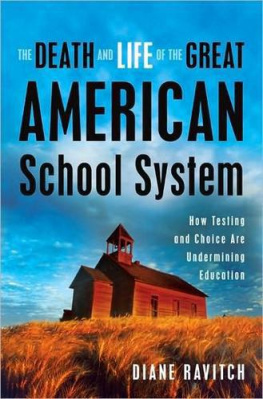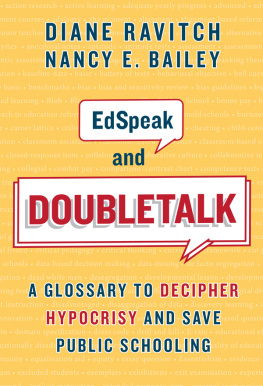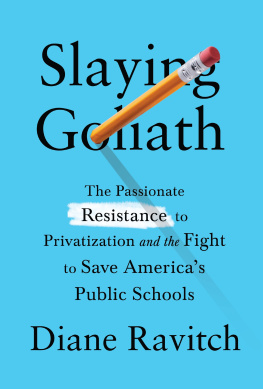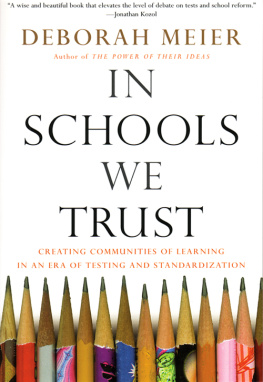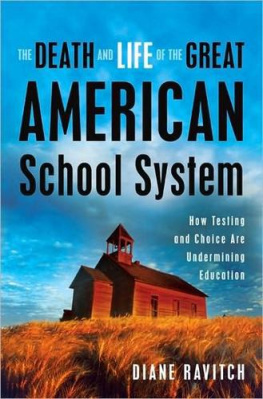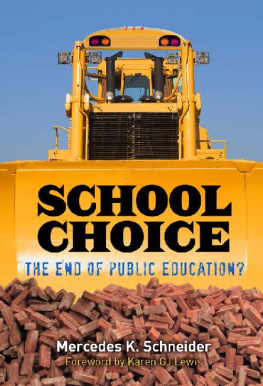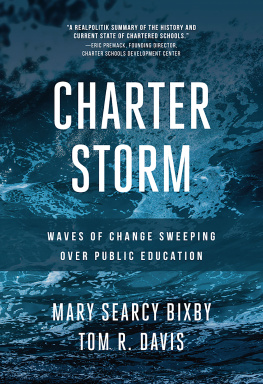Table of Contents
Also by Diane Ravitch
AUTHOR
Edspeak: A Glossary of Education Terms, Phrases, Buzzwords, and Jargon
The Language Police: How Pressure Groups Restrict What Students Learn
Left Back: A Century of Failed School Reforms
National Standards in American Education: A Citizens Guide
The Schools We Deserve: Reflections on the Educational Crisis of Our Times
The Troubled Crusade: American Education, 1945-1980
The Revisionists Revised: A Critique of the Radical Attack on the Schools
The Great School Wars: New York City, 1805-1973
COAUTHOR
What Do Our 17-Year-Olds Know? A Report on the First National Assessment of History and Literature
EDITOR
Debating the Future of American Education: Do We Need National Standards and Assessments?
The American Reader
Brookings Papers on Education Policy
COEDITOR
The English Reader
Kid Stuff: Marketing Sex and Violence to Americas Children
Making Good Citizens: Education and Civil Society
City Schools: Lessons from New York
New Schools for a New Century: The Redesign of Urban Education
Learning from the Past: What History Teaches Us about School Reform
The Democracy Reader
Challenges to the Humanities
Educating an Urban People: The New York City Experience
Against Mediocrity: Improving the Teaching of the Humanities in Americas High Schools
The School and the City: Community Studies in the History of American Education

This book is dedicated
with love to my grandchildren
Nico Zev
Aidan Thor
Elijah Lev
Acknowledgments
I HAVE BEEN FORTUNATE in having the help of many readers who offered their comments as the book evolved. Individual chapters, and in some cases, the entire book, were read by Samuel Abrams, Linda Darling-Hammond, Michael J. Feuer, Leonie Haimson, E. D. Hirsch Jr., Rita Kramer, Henry Levin, Jeffrey Mirel, Jeannie Oakes, Aaron Pallas, Linda Perlstein, Robert Pondiscio, Michael Ravitch, Sarah Reckhow, Richard Rothstein, Robert Shepherd, Lorraine Skeen, Sol Stern, and Andrew Wolf. Jordan Segall and Jennifer Jennings assisted me in interpreting demographic data. Of course, none of these individuals is responsible in any way for my conclusions or errors.
In pursuing information, I was helped by many people, including Anthony Alvarado, Elizabeth Arons, Kenneth J. Bernstein, Alan Bersin, Jennifer Bell-Ellwanger, Andrew Beveridge, Jonathan Burman, Sheila Byrd, David Cantor, Kathleen Cashin, Carl Cohn, John de Beck, Carmen Faria, David Ferrero, Eric Hanushek, Jeffrey Henig, Frederick Hess, Sam Houston, Dan Katzir, Richard Kessler, Mitz Lee, Robert Linn, Tom Loveless, Karen Hawley Miles, Howard Nelson, Michael Petrilli, Margaret Raymond, Bella Rosenberg, Anthony Shorris, Jacques Steinberg, Nancy Van Meter, Robin Whitlow, Joe Williams, Frances ONeill Zimmerman, and Camille Zombro.
Barbara Bartholomew was my interlocutor in San Diego, hauling me to appointments, helping me digest what I learned, and generally keeping me on task as I interviewed teachers, administrators, and district officials.
I was fortunate to have Diana Senechal as research assistant and editor in the final stages of revising the manuscript. She made sure that every word was just right, every footnote was accurate, every URL worked, the grammar and usage were correct, and the language flowed as it was supposed to. I can never thank her enough for the time that she enthusiastically invested in this book, other than to acknowledge it here.
For supporting my research, I thank the William E. Simon Foundation and the Achelis-Bodman Foundation.
I am thankful for the friendship of inspiring mentors, past and present, including Jeanne S. Chall, Lawrence A. Cremin, E. D. Hirsch Jr., Sandra Priest Rose, and Albert Shanker.
My deepest gratitude goes to my friend, colleague, and partner, Mary, who encouraged me as I wrote this book.
I thank my energetic literary agent, Lynn Chu of Writers Representatives, who believed in this project from the beginning. Many thanks to Meredith Smith and Antoinette Smith of Basic Books for their careful review of the manuscript, and to Lynn Goldberg and Angela Hayes of Goldberg-McDuffie, who gave me their wholehearted support. And I am grateful to Tim Sullivan, my editor at Basic Books, who quickly understood the book and suggested the title of my dreams. We both agreed that the title is a fitting homage to Jane Jacobs, whose book The Death and Life of Great American Cities helped to create a renaissance in the nations cities. Since I live the life that she wrote about, in a wonderful urban neighborhood saved by historic preservation, I love the idea of associating my book with hers, most especially with the hope that American education in general and urban education in particular might also experience a renaissance.
DIANE RAVITCH BROOKLYN, NEW YORK
CHAPTER ONE
What I Learned About School Reform
IN THE FALL OF 2007, I reluctantly decided to have my office repainted. It was inconvenient. I work at home, on the top floor of a nineteenth-century brownstone in Brooklyn. Not only did I have to stop working for three weeks, but I had the additional burden of packing up and removing everything in my office. I had to relocate fifty boxes of books and files to other rooms in the house until the painting job was complete.
After the patching, plastering, and painting was done, I began unpacking twenty years of papers and books, discarding those I no longer wanted, and placing articles into scrapbooks. You may wonder what all this mundane stuff has to do with my life in the education field. I found that the chore of reorganizing the artifacts of my professional life was pleasantly ruminative. It had a tonic effect, because it allowed me to reflect on the changes in my views over the years.
At the very time that I was packing up my books and belongings, I was going through an intellectual crisis. I was aware that I had undergone a wrenching transformation in my perspective on school reform. Where once I had been hopeful, even enthusiastic, about the potential benefits of testing, accountability, choice, and markets, I now found myself experiencing profound doubts about these same ideas. I was trying to sort through the evidence about what was working and what was not. I was trying to understand why I was increasingly skeptical about these reforms, reforms that I had supported enthusiastically. I was trying to see my way through the blinding assumptions of ideology and politics, including my own.
I kept asking myself why I was losing confidence in these reforms. My answer: I have a right to change my mind. Fair enough. But why, I kept wondering, why had I changed my mind? What was the compelling evidence that prompted me to reevaluate the policies I had endorsed many times over the previous decade? Why did I now doubt ideas I once had advocated?
The short answer is that my views changed as I saw how these ideas were working out in reality. The long answer is what will follow in the rest of this book. When someone chastised John Maynard Keynes for reversing himself about a particular economic policy he had previously endorsed, he replied, When the facts change, I change my mind. What do you do, sir? This comment may or may not be apocryphal, but I admire the thought behind it. It is the mark of a sentient human being to learn from experience, to pay close attention to how theories work out when put into practice.
What should we think of someone who never admits error, never entertains doubt but adheres unflinchingly to the same ideas all his life, regardless of new evidence? Doubt and skepticism are signs of rationality. When we are too certain of our opinions, we run the risk of ignoring any evidence that conflicts with our views. It is doubt that shows we are still thinking, still willing to reexamine hardened beliefs when confronted with new facts and new evidence.
Next page
